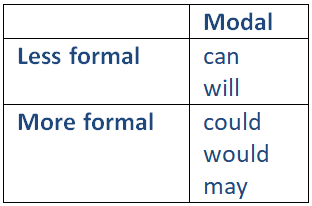


 Grammar
Grammar
 Tenses
Tenses
 Present
Present
 Past
Past
 Future
Future
 Parts Of Speech
Parts Of Speech
 Nouns
Nouns
 Verbs
Verbs
 Adverbs
Adverbs
 Adjectives
Adjectives
 Pronouns
Pronouns
 Pre Position
Pre Position
 Preposition by function
Preposition by function 
 Preposition by construction
Preposition by construction
 Conjunctions
Conjunctions
 Interjections
Interjections
 Grammar Rules
Grammar Rules
 Linguistics
Linguistics
 Semantics
Semantics
 Pragmatics
Pragmatics
 Reading Comprehension
Reading Comprehension|
Read More
Date: 2-6-2021
Date: 2-6-2021
Date: 3-6-2021
|
Using modals of requests and offers
We use the modals of requests and offers can, will, could, would, and may to ask for things, make offers, invite people, and order in a restaurant. These modals all have the same basic meaning, but some are more formal than others.

We use can or will in informal situations, for example with friends and family.

We use could, would, or may in more formal situations, for example with strangers, people in authority, or older people.

Affirmative questions
We usually use these modals in questions, so the modal is followed by the subject and the base form of a verb.
In requests and offers, will and would are only used with you. Similarly, may is only used with I or we.

Offers
We use can, could, and may when we offer to do things.

We can also make offers by asking what someone would like.

Invitations
We use can, will, could, and would like when we invite someone to do something.

Food orders
We can use I'll have (I will have) when ordering food or drinks in a restaurant.

I'd like (I would like) is a more polite way of ordering food or drinks.

Making requests
We use modals of request when we ask someone to do something or when we want something.

We put please after the subject or at the end of a sentence to make any request more polite.

We put not before the verb for negative requests – to ask someone not to do something.

Answering requests
We usually answer requests with can, will, and can't.
We generally don't use could or would in short answers, and we try to avoid using won't because it sounds impolite and angry.

If we use can't in a short answer, we often use sorry or I'm sorry to make it sound more polite.

|
|
|
|
التوتر والسرطان.. علماء يحذرون من "صلة خطيرة"
|
|
|
|
|
|
|
مرآة السيارة: مدى دقة عكسها للصورة الصحيحة
|
|
|
|
|
|
|
نحو شراكة وطنية متكاملة.. الأمين العام للعتبة الحسينية يبحث مع وكيل وزارة الخارجية آفاق التعاون المؤسسي
|
|
|